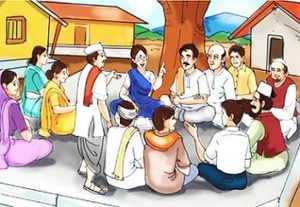Table of Contents
Daily Current Affairs for Government Exams:
Today Current Affairs:30th March 2020 for UPSC IAS exams, State PSC exams, SSC CGL, State SSC, RRB, Railways, Banking Exam & IBPS, etc.
Contents:
- Himalayan Ibex: a distinct species from the Siberian Ibex
- Disinvestment :
- VIX: Measure of Market Volatility
- Plasma therapy
- Biological Weapons Convention
- The Karnataka Gram Swaraj and Panchayat Raj (Amendment) Bill, 2020:
- Other important current affairs
1. Himalayan Ibex is a distinct species from the Siberian Ibex.:

Himalayan Ibex is a distinct species from the Siberian Ibex.
- The paper, ‘Genetic evidence for allopatric speciation of the Siberian Ibex (Capra sibirica) in India,’ has recently been published in Endangered Species Research, an international peer-reviewed journal.
- The researchers, under a project funded through the National Mission on Himalayan Studies implemented by the Ministry of Environment, undertook field surveys and collected fecal samples from Lahaul and Spiti, Himachal Pradesh.
- Himalayan Ibex is distributed in the trans-Himalayan ranges of Jammu and Kashmir, Ladakh and Himachal Pradesh up to the river Sutlej.
- Siberian Ibex is a species of wild goat and is distributed in diverse habitats, ranging from cold deserts, rocky outcrops, steep terrain, high-land flats and mountain ridges to low mountains and foothills.
- From Mongolia, its distribution extends towards Altai, Hangai, Gobi-Altai, the Hurukh mountain ranges as well as the Sayan Mountains near Russia and scattered populations in the small mountains of Trans-Altai Gobi.
2.Disinvestment :

In a bid to shore up its disinvestment kitty ahead of the end of the fiscal, the Centre raised Rs. 13,883 crore through strategic sale of its stake in two state-owned power companies, THDCIL and NEEPCO, and Kamarajar Port Ltd to other state-owned entities.
- It has sold 74.49 percent stake in THDC India Ltd (THDCIL) for Rs 7,500 crore and 100 percent in North Eastern Electric Power Corporation (NEEPCO) for Rs 4,000 crore to state-owned power utility NTPC. Further, the Centre sold 66.67 per cent in Kamarajar Port Ltd to Chennai Port Trust for Rs 2,383 crore.
- This takes the Centre’s total collections from disinvestment at Rs 48,728.06 crore so far in FY20, which still falls short of the revised target of Rs 65,000 crore for the ongoing financial year.
Targets for the next financial year:
- For the upcoming fiscal’s budget, the government has announced an ambitious disinvestment agenda, aiming to raise Rs 2.1 lakh crore via stake sales, including plans to list Life Insurance Corporation on stock exchanges and sale of its stake in IDBI Bank.
- Privatisation of BPCL, Container Corporation of India, Shipping Corporation of India and national carrier Air India will be other key issues next year.
3.VIX: Measure of Market Volatility:
VIX (Volatility Index) is an index used to measure the near term volatility expectations of the markets.
- Volatility signifies the rate and magnitude of change in the stock price or index value.
- The movement in the VIX index reflects the overall market volatility expectations over the next 30 days.
- Given the nature of the index, it is also known as ‘fear gauge’ or ‘fear index’.
- The VIX index was first created by the Chicago Board Options Exchange (CBOE) and introduced in 1993 based on the prices of the S&P 500 index.
- India VIX was launched by National Stock Exchange (NSE) in 2010 and is based on the computation methodology of CBOE though amended to align with the Indian markets.
- India VIX indicates the Indian market’s volatility from the investor’s perception.
- Volatility and the value of India VIX move parallel. i.e a spike in the VIX value means the market is expecting higher volatility in the near future and vice versa.
- India VIX also has a strong negative correlation with Nifty. i.e every time India VIX falls, Nifty rises and when India VIX rises, Nifty falls.
- VIX value is among the important parameters that are taken into account for the pricing of options contracts, which are one of the most popular derivative instruments.
4.Plasma therapy:

As the proportion of patients infected with COVID-19 continues to rise in the United States, the Food and Drug Administration is facilitating access to COVID-19 convalescent plasma for use in patients with serious or immediately life-threatening COVID-19 infections.
Convalescent plasma therapy
- It seeks to make use of the antibodies developed in the recovered patient against the coronavirus.
- The whole blood or plasma from such people is taken, and the plasma is then injected in critically ill patients so that the antibodies are transferred and boost their fight against the virus.
- WHO guidelines in 2014 mandate a donor’s permission before extracting plasma. Plasma from only recovered patients must be taken, and donation must be done from people not infected with HIV, hepatitis, syphilis, or any infectious disease.
- Whole blood is collected, the plasma is separated by sedimentation or centrifugation, then injected in the patient.
- If plasma needs to be collected again from the same person, it must be done after 12 weeks of the first donation for males and 16 weeks for females, the WHO guidelines state.
6. Biological Weapons Convention.:

March 26 marked the 45th anniversary of the entry into force of the Biological Weapons Convention. The anniversary comes as the world is grappling with the Coronavirus pandemic.
- The Convention on the Prohibition of the Development, Production and Stockpiling of Bacteriological (Biological) and Toxin Weapons and on Their Destruction is usually referred to as the Biological Weapons Convention (BWC) or Biological and Toxin Weapons Convention (BTWC).
- The Biological Weapons Convention (BWC) is a legally binding treaty that outlaws biological arms.
- The BWC is the first multilateral disarmament treaty to ban an entire category of weapons of mass destruction.
- The BWC opened for signature in 1972 and entered into force in 1975.
- It currently has 183 states-parties, including Palestine, and four signatories. Ten states have neither signed nor ratified the BWC.
The BWC bans:
- The development, stockpiling, acquisition, retention, and production of:
- Biological agents and toxins “of types and in quantities that have no justification for prophylactic, protective or other peaceful purposes;”
- Weapons, equipment, and delivery vehicles “designed to use such agents or toxins for hostile purposes or in armed conflict.”
- The transfer of or assistance with acquiring the agents, toxins, weapons, equipment, and delivery vehicles described above.
Exceptions:
- The BWC does not ban the use of biological and toxin weapons but reaffirms the 1925 Geneva Protocol, which prohibits such use.
- It also does not ban biodefense programs.
7.The Karnataka Gram Swaraj and Panchayat Raj (Amendment) Bill, 2020:

The Karnataka Gram Swaraj and Panchayat Raj (Amendment) Bill, 2020 was passed by the Karnataka Assembly to bring about major changes in the functioning of the rural local bodies in Karnataka.
- The Bill amends the Karnataka Gram Swaraj and Panchayat Raj act, 1993.
- It reduces the term of the offices of presidents and vice-presidents of gram panchayats, taluk panchayats and Zilla panchayats from five years to 30 months.
- The no-confidence motion could not be moved against the presidents and vice-presidents of all three-tiers of local bodies before 15 months from the date of the election.
- At present, a no-confidence motion can be moved within 30 months from the date of the election.
- The Deputy Commissioner would preside over the meeting while no-confidence motion is considered in taluk panchayat and the regional commissioner would preside in the case of ZP.
- In case the no-confidence moved is defeated, then no such motion is to be moved again in the next six months.
- The Bill envisages some electoral reforms and that included the closing of liquor shops 48 hours before the polling of panchayats.
- On property tax collection by GPs: It has proposed no tax on vacant land in the airport or industrial area or industrial areas where plantations are grown. It proposes to levy a 0.10% tax on the capital value of the property on the runway area of an airport.
Other important current affairs:
1. The nationwide lockdown, to prevent COVID-19, has led to minimal air pollution in over 90 cities including Delhi. Environmentalists have welcomed the reduction in pollution and have urged the government to treat it as a wake-up call and stop the development at the cost of the environment.
2. Manipur Speaker Yumnam Khemchand has disqualified Thounaojam Shyamkumar as a member of the Assembly for defection. Shyamkumar had joined the BJP shortly after being voted to power on a Congress ticket during the 2017 Assembly polls. This was clearly in violation of the provisions of the 10th Schedule of the Constitution of India.
3. Ministry of Labour and Employment has amended the EPF Scheme 1952. It allows the withdrawal of non-refundable advance by EPF members in the wake of the COVID-19 pandemic in the country. The notification permits withdrawal not exceeding the basic wages and dearness allowance for three months or up to 75 percent of the amount standing to member’s credit in the EPF account in the event of an outbreak of epidemic or pandemic.
4. The government has set up the Prime Minister’s Citizen Assistance and Relief in Emergency Situations Fund (PM-CARES Fund) to deal with any kind of emergency or distress situation like posed by the COVID-19 pandemic. This Fund has been set up owing to a number of requests made by the people to support the government in the wake of the COVID-19 emergency.
5. To help fund the emergency relief package, Kerala proposes to borrow as much as ₹12,500 crores from the market in April itself and therefore the Chief Minister has urged the Centre to provide Kerala with flexibility under the Fiscal Responsibility and Budget Management (FRBM) Act so as to ensure that the State’s finances are not adversely impacted in the rest of the financial year starting on April 1.
6. During the coronavirus outbreak, penal provisions, such as Sections 269 and 270 of the IPC, are being invoked to enforce the lockdown orders in various states. Sections 269 and 270 have been used to book persons defying quarantine orders for containing the spread of the pandemic.
7. Recently, the Union Minister of Health & Family Welfare launched the COVID-19 National Teleconsultation Centre (CoNTeC). The CoNTeC is a Telemedicine Hub established by AIIMS, New Delhi, wherein expert doctors from various clinical domains will be available 24×7 to answer the multifaceted questions from specialists from all over the country.
8. The Export Promotion Council for Handicrafts (EPCH) has canceled the 49th edition of the Indian Handicrafts & Gifts (IHGF) Delhi Fair Spring-2020 in view of the present status of COVID-19 in India and abroad. Indian Handicrafts & Gifts Fair (IHGF) is Asia’s largest gifts & handicrafts trade fair.
9. Agriculture, farming and allied activities have been exempted from the nationwide lockdown. The decision has been taken with a view to addressing problems being faced by the farming community in the harvesting of their crops and transporting foodgrains to the mandis. This will also ensure uninterrupted harvesting of crops.
10. The U.S. Air Force has canceled the Phase-I of Red Flag due to the COVID-19 outbreak. It is a Pacific Air Forces-sponsored exercise meant to provide realistic training in a simulated combat environment over the Joint Pacific Alaska range complex. It is USA’s flagship multilateral air exercise.
11. Invest India has launched The Invest India Business Immunity Platform. The platform is designed as a comprehensive resource to help businesses and investors get real-time updates on India’s active response to COVID-19 (Coronavirus).
12. While people are struggling for masks and sanitizers in the urban areas, Gond tribal people living in Panna, Madhya Pradesh have devised their own way to make masks to fight coronavirus. Tribal people are making masks with medicinal leaves and following traditional ways to prevent the spread of the coronavirus.
13. Earth Hour 2020 was held on March 28, from 8:30 pm to 9:30 pm. Earth Hour is a global grassroots movement uniting people to take action on environmental issues and protect the planet. Organized byWorld Wide Fund for Nature (WWF). Earth Hour was started as a lights out event in Sydney, Australia in 2007.
14.RBI has notified with a circular that the mega-merger of 10 PSBs into 4 will be effective from the start of the new financial year (1st April 2020), as per the amalgamation scheme. As per the scheme, Oriental Bank of Commerce and United Bank of India will be merged into Punjab National Bank; Syndicate Bank into Canara Bank; Allahabad Bank into Indian Bank; and Andhra and Corporation banks into Union Bank of India.
16. The International Table Tennis Federation (ITTF) announced that it is suspending all the planned events until June 30, 2020. The decision was taken during the ITTF meeting that was held to discuss the effects of the Novel Corona Virus.
17. The Asian Development Bank announced that it is to invest 100 million USD in National Investment and Infrastructure Fund (NIIF). The investment during an economic slow down is a great boost for the Indian Economy
18.The government has approved Insurance Scheme announced under Pradhan Mantri Garib Kalyan Package for health workers who are fighting to contain COVID-19. The scheme will provide an insurance cover of 50 lakh rupees for ninety days to around 22.12 lakh public healthcare providers including community health workers.
The scheme will also include accidental loss of life on account of contracting COVID-19.
19. The Government of India has launched a coronavirus risk-tracking app called ‘Corona Kavach’ to protect Indian citizens from getting infected by COVID-19. Jointly developed by the Union Ministry of Electronics and Information Technology and the Union Ministry of Health and Family Welfare, the app uses a person’s location to assess whether they are in the high-risk geographical zone or not. The app is now available for download on Google Play Store for Android phones.




